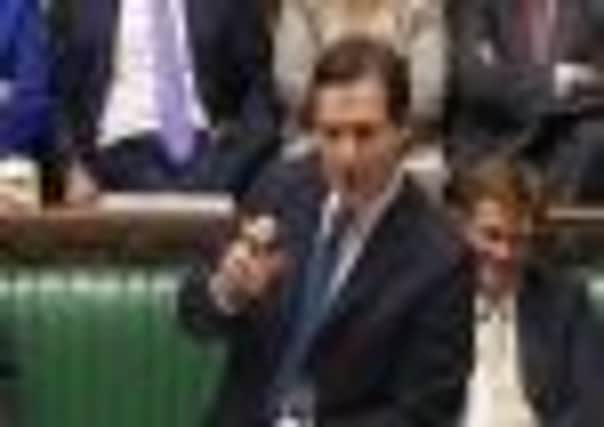Barclays Libor scandal: George Osborne refuses to say sorry over Ed Balls rate-fixing claim


Shadow chancellor Ed Balls accused the Chancellor of “impugning his integrity” after claiming the Labour heavyweight was involved in the Barclays Libor-fixing scandal.
Mr Balls called on George Osborne to withdraw the “false, personal accusations” that were made “purely in the hope of political advantage”.
Advertisement
Hide AdAdvertisement
Hide AdHowever, the Chancellor replied: “The idea that I am going to take lessons in integrity from the man who smeared his way through 13 years of Labour government, who half the people who ever served with him think he was a disgrace in his post, is another thing.”
MPs voted by 330 to 226 – a majority of 104 – to set up the inquiry, which will be led by Treasury select committee chairman Andrew Tyrie.
The Commons refused Labour’s demands for a Leveson Inquiry-style investigation into the culture of the City, rejecting the proposal by 81 votes.
Mr Balls said Labour would take part in the parliamentary inquiry, but would demand a wider-scale investigation.
Mr Balls said Labour would work with Mr Tyrie, but added that his party had “very real concerns” about the membership of the joint committee that will now be set up. He said: “It is clear there is a wider set of questions, from mis-selling to small businesses to the wider culture and practices of the banking industry, which are outside the scope of the inquiry.”
He accused Mr Osborne and David Cameron of “a very grave error of judgment”, adding that when future scandals emerged the public would call for independent public inquiries.
But Mr Osborne said work would now begin on who should sit on the committee.
He added: “What everyone now wants to do is get a resolution that all sides can agree on… and we can get this joint committee up and running.”
Advertisement
Hide AdAdvertisement
Hide AdEarlier in the debate, Mr Tyrie outlined his conditions for chairing an inquiry, calling for “tightly drawn and forward-looking” terms of reference.
He said: “This cannot be a witch-hunt. An exhaustive, inquisitorial committee of inquiry, whether in or out of parliament, into the respective roles and responsibilities for mistakes of ministers, civil servants, the Bank of England, regulators and commercial banks would do more for the history books than the quality of legislation.
“The job of the committee must be on how to get one part of the Banking Reform Bill in better shape and in quick time.”
The ill-tempered Commons debate followed a magazine interview in which Mr Osborne said former prime minister Gordon Brown’s inner circle, which included Mr Balls, had “questions to answer” over apparent pressure on Barclays to post lower Libor rates during the credit crunch.
Mr Balls told Mr Osborne: “The cheap and partisan and desperate way in which you and your aides have conducted yourselves in recent days does you no good, it demeans the office you hold and, most important, it makes it harder to achieve the lasting consensus we need.”
The Chancellor called on Mr Balls to “explain what Labour’s involvement was, who were the ministers, who had the conversation, who were the senior figures” and said he had to “answer for his time in office”.